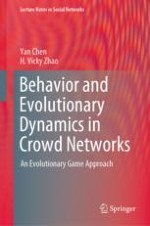2020 | OriginalPaper | Buchkapitel
4. “Smart” Evolution with Indirect Reciprocity
verfasst von : Yan Chen, H. Vicky Zhao
Erschienen in: Behavior and Evolutionary Dynamics in Crowd Networks
Verlag: Springer Singapore
Aktivieren Sie unsere intelligente Suche, um passende Fachinhalte oder Patente zu finden.
Wählen Sie Textabschnitte aus um mit Künstlicher Intelligenz passenden Patente zu finden. powered by
Markieren Sie Textabschnitte, um KI-gestützt weitere passende Inhalte zu finden. powered by
